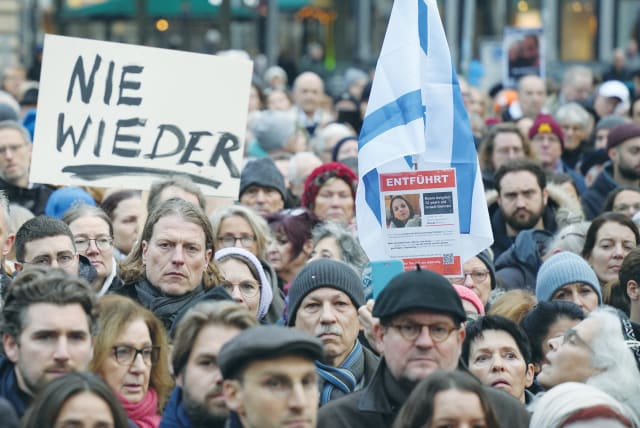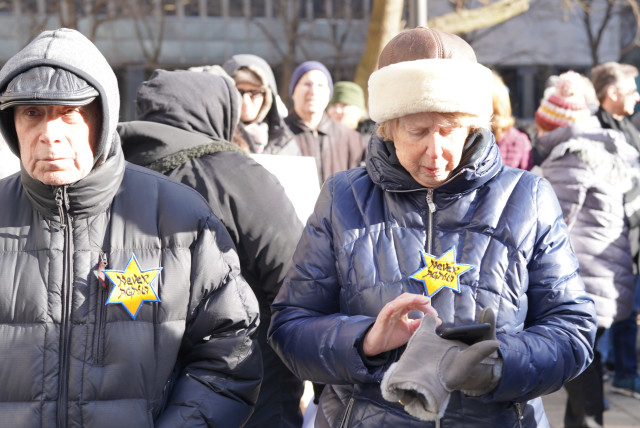Understanding the concept of ‘never again’ through war against Hamas - opinion

Out of shock and depression, some Israelis said that “never again” was an empty, meaningless slogan. Israel had been unable to prevent the October 7 massacre.
In the 1960s and 1970s when consciousness of the Shoah broke through to the public, the term “Never Again” spoke to me and my generation.
The Holocaust was so enormous a crime, the Nazis behavior was so evil, the by-standing of the world was so shocking, the conscience of the world was so tormented by the death of the six million that such a genocide would never be allowed to happen again.
In 1947, the United States and Communist Russia – despite the cold war between them – voted together for United Nations resolution 181, authorizing the creation of a Jewish state. Russian Foreign Minister Gromyko stated that the Allies had failed to protect their own populations (= the Jews) against the Nazis. Therefore, there was a moral obligation to allow the Jews a state that would protect them in the future.
In the 1960s Israel decided to arm itself with nuclear weapons. Israel was aided by the French government. French Prime Minister Bourges-Manoury told the Israelis: “I gave you the bomb in order to prevent another Holocaust… ”
The United States objected to Israel’s acquisition of nuclear armaments. However in 1969, then-President Richard Nixon made an informal arrangement with Israel that the US would accept Israel’s nuclear capability – as a guarantee against Israel’s unique vulnerability to a potential Holocaust. (Israel promised to not go public with its nuclear capability.)
Democratic Western Germany started paying reparations to Israel and to survivors of the Holocaust. Germany also undertook to be a special ally and ongoing protector of the Jewish state as a way of taking responsibility for what Nazi Germany did to the Jewish people in the Holocaust.
There was a precipitous drop in antisemitic attitudes and practices in the United States. The postwar association of Jew-hatred with barbarism, mass murder, and inhumanly cruel behavior, put antisemitism beyond the pale.
Diaspora Jewry overwhelmingly turned to Zionism and supporting Israel. Post-Holocaust Jews understood that they must take power to protect themselves. This translated into maximum financial support and then political activism to assure that a Jewish state would defend Jewish lives and offer persecuted Jews, anywhere in the world, a guaranteed haven.
“Never again” was a driving force in the Christian renewal movement to purge Christianity of its heritage of anti-Judaism. At Vatican II, the Catholic Church’s Nostra Aetate declaration repudiated the deicide change and rejected antisemitism.
THE SECOND half of the twentieth century was a golden age for Jewry. Consequently, the understanding of “never again” was more benign and broader in scope, reflecting the glow of renewed life and Jewish greater acceptance in the Diaspora, while Israel grew by leaps and bounds. The climactic victory of the flowering came in liberating Soviet Jewry and restoring them to the world Jewish community. This redemption occurred in the midst (and was a partial cause) of the triumph of democracy over totalitarianism.
Note: Democracy is good for Jews, especially because it makes room for differences, for entrepreneurial initiatives, and particularist communities as well as a variety of cultures and religions. Totalitarianism demands homogeneity so sooner or later, it turns on the unassimilated Jews.
The 21st century brought a push back at the Jewish advance. The Arab nations were not “softened” by consciousness of the Shoah and guilt. Over time, Holocaust denial and unfettered antisemitism spread in Islamic countries. The Arabs tried to destroy the Jewish state repeatedly.
The Soviet Union and its satellite nations joined in delegitimizing the existence of a Jewish state – as in the 1975 United Nations resolution 3379, declaring that “Zionism is a form of racism.” Although the resolution was repealed in 1991 after the collapse of Communism, the demonization of Israel continued, including among radical regimes elsewhere for whom Israel was an avatar for America and for capitalism, which they loathed. Since 2015, the General Assembly has adopted 140 resolutions criticizing Israel compared to 68 critical resolutions against all other countries in the world.
In Europe, antisemitism lived on in far Right (and neo-Nazi) circles. In America, antisemitism survived alongside white supremacist and other discredited world views, in circles beyond the pale. In the Trump administration, these views surfaced with a vengeance. Conspiracy theories abounded in these circles and such theories often attach to Jews or tropes about Jews.
In recent decades, a “woke” philosophy gained strength on the Left, especially in academia. White people were all in the oppressor class. People of color, indigenous people and minorities suffering discrimination were in the oppressed class. Group membership defined morality. Whatever oppressors did was wrong, whatever the oppressed did was right. Intersectionality developed as an ethics corollary. All discriminated minorities stood together and should support each other.
Jews were labeled white to give them the label of oppressor
JEWS WERE labeled as white, (by definition meaning oppressors) – dismissing past persecution of Jews or their record supporting the rights of people of color and other minorities. Israel was labeled “white” and “colonialist’” (ignoring the 50% plus Israelis who were Arab Jews or Ethiopian). The Palestinians were classified as people of color. The fact that Israel was the only democracy in the Middle East and that Israeli Jews were way ahead on women’s and rights of the LGBT (lesbian, gay, bisexual and transgender) community were dismissed.
All these forces blew up in a perfect storm of antisemitism and anti-Zionism in the support for Hamas’s October 7 massacre. Particularly unnerving to Jews was that younger Americans, in significant percentages, accepted the Palestinian narrative that Israel was the oppressor and that Hamas tactics were legitimate “resistance” rather than despicable atrocities.
Out of shock and depression, some Israelis said that “never again” was an empty, meaningless slogan. Israel had been unable to prevent the October 7 massacre.
Yet Israel has the power and the will to defeat Hamas and other existential enemies and restore its deterrence power. When the dust settles, Jews will find that they have more allies and political support among the nations. Therefore, “never again” remains a powerful and important policy guide.
However, it must be understood in a less naive way. Never again does not mean that there will be no significant antisemitism or even existential threats aimed at Jewry or the State of Israel. It means that Jewry has been given a license to protect itself against its enemies in a spirit guided by the lessons of the Holocaust.
In Israel, Jews – have taken power and are ready (to paraphrase former president John F. Kennedy) “to pay any price, bear any burden, meet any hardship, support any friend, oppose any foe to assure the survival and the success of the Jewish people and the Jewish state.”
Some will say that the price is too high and they cannot bear the burden of Jewishness.
The vast majority of Jews understand that we will have to give our all and sacrifice some of our best lives to live our destiny. The hopeful truth is that the Jewish people have done this before and can do it again.
The writer is a leading Jewish thinker who has written on post-Holocaust theology, the State of Israel, and the ethics of Jewish power. He is author of The Triumph of Life (Jewish Publication Society, forthcoming).
Jerusalem Post Store
`; document.getElementById("linkPremium").innerHTML = cont; var divWithLink = document.getElementById("premium-link"); if (divWithLink !== null && divWithLink !== 'undefined') { divWithLink.style.border = "solid 1px #cb0f3e"; divWithLink.style.textAlign = "center"; divWithLink.style.marginBottom = "15px"; divWithLink.style.marginTop = "15px"; divWithLink.style.width = "100%"; divWithLink.style.backgroundColor = "#122952"; divWithLink.style.color = "#ffffff"; divWithLink.style.lineHeight = "1.5"; } } (function (v, i) { });

